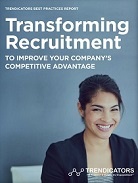
Managers with highly engaged employees deliver improved business outcomes, including increased retention, higher productivity rates and lower absenteeism.
With many leading HR organizations successfully integrating artificial intelligence (AI) technologies into recruiting processes, AI and machine learning are improving recognition experiences. Yet there are essential differences between the effective use of AI in recruiting and recognition. In recruiting, AI has proven most successful in helping decision-makers source, screen and evaluate large numbers of candidates. For managers, recognition is not a volume process but a personal expression of appreciation.
While many of the advances discussed in our latest eBook, How Can AI Transform Employee Recognition, are forward-looking, they represent a blueprint for AI’s future in helping managers become more effective at engaging, motivating and recognizing their team members.
Here are a few takeaways from the report:
Employee recognition is a personal expression of appreciation, and it can improve engagement, enhance individual and team performance and reduce attrition. In addition, employees truly value recognition when given to them. Our research has shown that managers profoundly influence the practice and effectiveness of employee recognition programs. However, HR leaders often lack the resources to help managers improve their engagement and recognition skills. That is where AI can address challenges and provide opportunities for improvement.
Yes, risks come with implementing AI in recognition programs and managing compliance. The most significant risk AI poses in recognition is that it will replace genuine human expression with robotic communication that lacks authenticity (think CHATGPT). In addition, AI can also inadvertently exacerbate existing discriminatory practices if not carefully managed.
However, there are opportunities for machine learning and AI to integrate with the tools managers uses to plan, communicate and coordinate daily activities. Today, many systems have prompts and notifications for managers to stay on top of recognition, or assistance in deciding the right type of recognition or reward to issue through a series of questions. The next wave of AI innovation is called agentic AI. While generative AI chatbots, copilots and suggestion engines assist users with specific tasks, they are largely reactive, responding to user input based on a predefined logic. In contrast, agentic AI systems are proactive, acting autonomously to plan ahead. In recognition, generative and agentic AI systems can work together as intelligent assistants to help managers build strong, genuine connections with employees.
Managers are already overburdened and often asked to do less with more, and from research, we know that many managers do not understand how to deliver recognition effectively. If you package that with managers underestimating the importance of recognition, AI can be seen as a support tool to overcome many of these challenges and make delivering recognition faster and easier.
Our advisory board unanimously agreed on current challenges regarding improving managers’ effectiveness in delivering positive and more personally relevant recognition experiences. They also concurred that incorporating AI into recognition practices will require careful planning to ensure the accuracy of system training data, as well as collaboration with senior leadership and IT, legal and procurement teams to align with enterprise strategies and policies for the governance of AI.
To continue reading this eBook, download a copy of How Can AI Transform Employee Recognition? below!
Special thanks to our Trendicators Advisory Board members and Dr. Charles Scherbaum for the thoughtful conversation and contributions to this topic!



